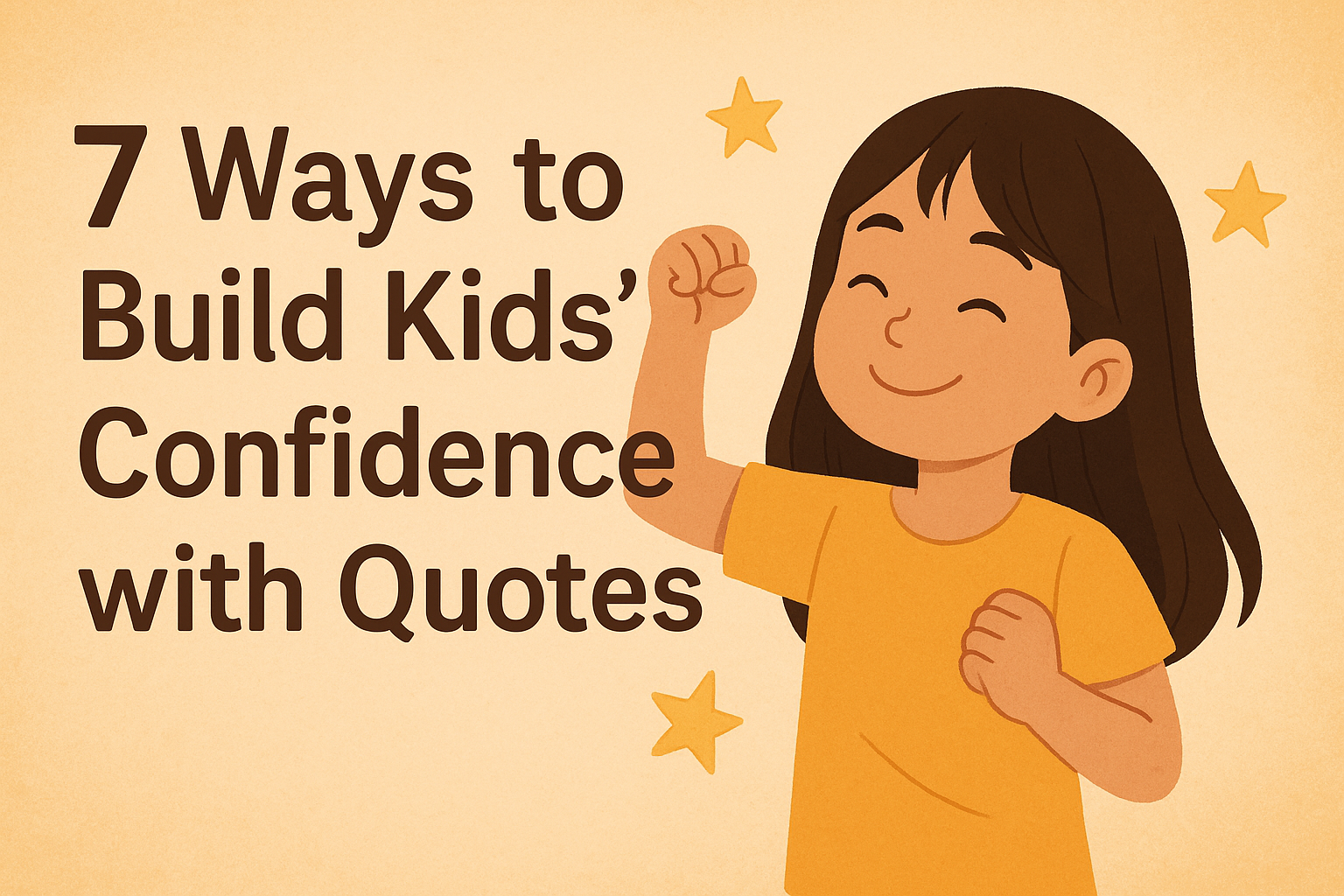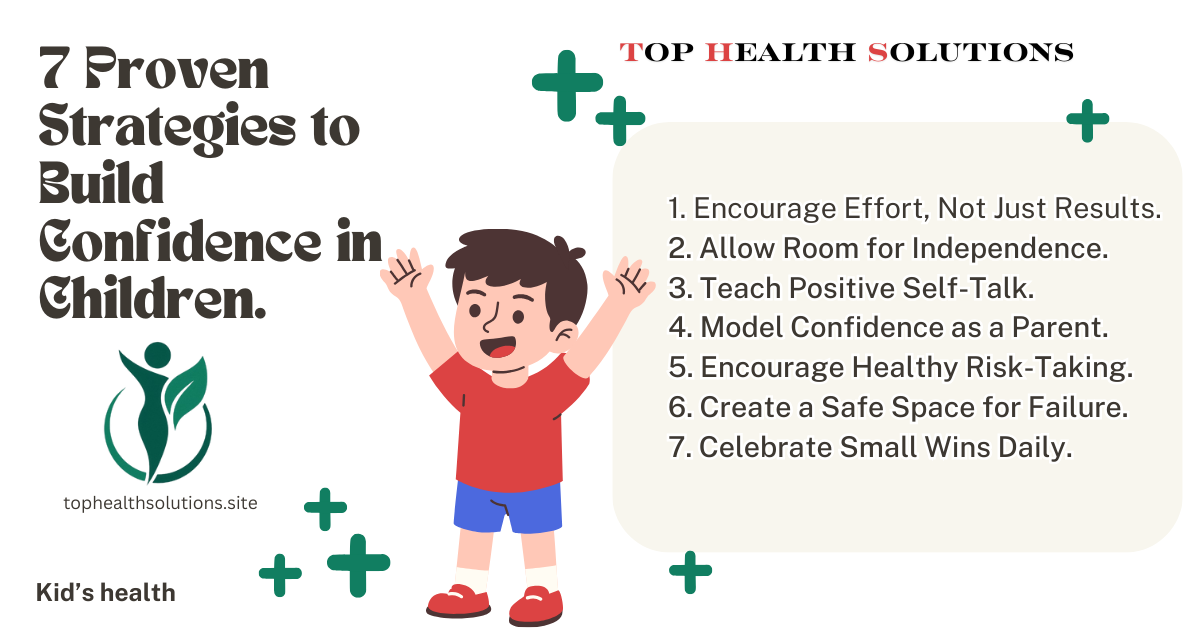"Explore the importance of health and wellness in today’s busy lifestyle and discover effective tips, strategies, and trusted resources to improve your well-being & live a healthier life."
Confidence is one of the greatest gifts you can give your child. A confident child is more likely to succeed in school, build healthy relationships, and navigate life’s challenges with resilience. But confidence doesn’t come automatically—it must be nurtured through daily habits, guidance, and encouragement.
In this article, we’ll explore 7 powerful strategies to build confidence in children, backed by psychology and parenting experts. Along the way, we’ll also look at some inspiring confidence quotes that parents can share with kids to boost their self-esteem.
1. Encourage Effort, Not Just Results.
Children often associate their worth with outcomes—winning a game, scoring high on a test, or drawing the “perfect” picture. As a parent, it’s crucial to shift the focus from results to effort. Praise them for trying, practicing, and learning rather than just succeeding.
This approach teaches kids that persistence and hard work are more valuable than perfection. According to Harvard Health, encouraging effort builds a growth mindset, which is strongly linked to resilience and confidence.
2. Allow Room for Independence.
Confidence grows when children feel capable of handling tasks on their own. Whether it’s dressing themselves, packing their school bag, or solving a small problem, independence fuels self-belief.
Of course, parents should offer support—but avoid stepping in too quickly. Let your child struggle a little before offering help. This teaches problem-solving and builds inner strength.
👉 According to Verywell Family, allowing children to make age-appropriate choices boosts autonomy and confidence.
Lorem ipsum dolor sit amet, consectetur adipiscing elit. Ut elit tellus, luctus nec ullamcorper mattis, pulvinar dapibus leo.
3. Teach Positive Self-Talk.
Children often internalize negative thoughts: “I’m not good at math” or “Nobody likes me.” These beliefs can crush confidence. As a parent, you can teach them positive self-talk to replace these thoughts with empowering ones.
For example:
You can even create a daily routine where your child repeats confidence quotes or affirmations in front of the mirror. This practice has been shown to increase self-esteem and resilience.
4. Model Confidence as a Parent.
Children learn more from what they see than what they hear. If you want your child to believe in themselves, show them what confidence looks like.
Speak kindly about yourself.
Show calmness when facing challenges.
Avoid negative self-criticism in front of your kids.
When parents model resilience and optimism, kids naturally mirror that behavior. According to Psychology Today, children who grow up with confident role models are more likely to develop strong self-esteem.
5. Encourage Healthy Risk-Taking.
Overprotecting children can unintentionally harm their confidence. Kids need opportunities to try new things—even if it means risking failure.
Let them audition for the school play, join a new sports team, or try a challenging hobby. Success will boost their confidence, and failure will teach resilience.
A study highlighted by Mayo Clinic shows that children who engage in manageable risks are better equipped to handle setbacks in adulthood.
6. Create a Safe Space for Failure.
Many children fear failure because they think it defines their worth. But failure is not the opposite of success—it’s part of the journey. Parents can create a safe environment where mistakes are seen as opportunities to learn.
When your child fails at something, instead of showing disappointment, encourage reflection:
This mindset shifts failure from something to fear into something to embrace.
7. Celebrate Small Wins Daily.
Confidence doesn’t come from big achievements alone. It grows in the little moments—finishing homework on time, helping a sibling, or speaking up in class. Celebrate these small wins with enthusiasm.
A daily dose of acknowledgment reinforces positive behavior and strengthens self-belief.
You can even keep a “confidence jar” at home—each time your child accomplishes something, write it on a slip of paper and place it inside. Over time, they’ll see how much they’ve achieved.
Final Thoughts.
Building confidence in children is a journey—not a single lesson. By encouraging effort, promoting independence, modeling confidence, and celebrating progress, you’re giving your child a lifelong gift.
Sharing confidence quotes with your kids can also spark motivation and remind them of their inner strength. Words are powerful, and when children hear them consistently, they start to believe in themselves.
Remember: confidence isn’t about being perfect—it’s about believing you are capable, even when challenges come your way.
✨ Confidence Quote for Kids:
- It’s not whether you get knocked down, it’s whether you get up.” – Vince Lombardi.
Believe you can, and you’re halfway there.” – Theodore Roosevelt.
- You are braver than you believe, stronger than you seem, and smarter than you think.” – A.A. Milne.
- Children learn more from what you are than what you teach.” – W.E.B. Du Bois.
Our greatest glory is not in never failing, but in rising every time we fall.” – Confucius.
- Failure is simply the opportunity to begin again, this time more intelligently.” – Henry Ford.
- Little by little, one travels far.” – J.R.R. Tolkien.





